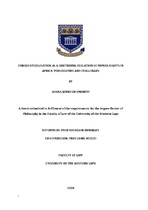| dc.contributor.advisor | Durojaye, Ebenezer | |
| dc.contributor.author | Omoruyi, Aisosa Jennifer | |
| dc.date.accessioned | 2021-04-06T07:23:16Z | |
| dc.date.available | 2021-04-06T07:23:16Z | |
| dc.date.issued | 2020 | |
| dc.identifier.uri | http://hdl.handle.net/11394/8124 | |
| dc.description | Doctor Legum - LLD | en_US |
| dc.description.abstract | International standards recognise the basic right of all women and girls to make free choices about reproduction including the number if any, spacing and timing of their children without being subjected to discrimination, coercion, or violence. The enjoyment of this right by many women in the world has overtime been interfered with through forced sterilisation which has a salient history beginning with the eugenics movement in the 20th century indicating a disproportionate impact on the poor, ethnic minorities, women with disabilities, transgender group, as well as women living with HIV. | en_US |
| dc.language.iso | en | en_US |
| dc.publisher | University of the Western Cape | en_US |
| dc.subject | Forced sterilisation | en_US |
| dc.subject | Jurisdiction ratione temporis | en_US |
| dc.subject | The rule against retroactivity | en_US |
| dc.subject | Access to justice | en_US |
| dc.subject | Past human rights violations | en_US |
| dc.subject | Intersectionality | en_US |
| dc.title | Forced sterilisation as a continuing violation of human rights in Africa: Possibilities and challenges | en_US |
| dc.rights.holder | University of the Western Cape | en_US |

